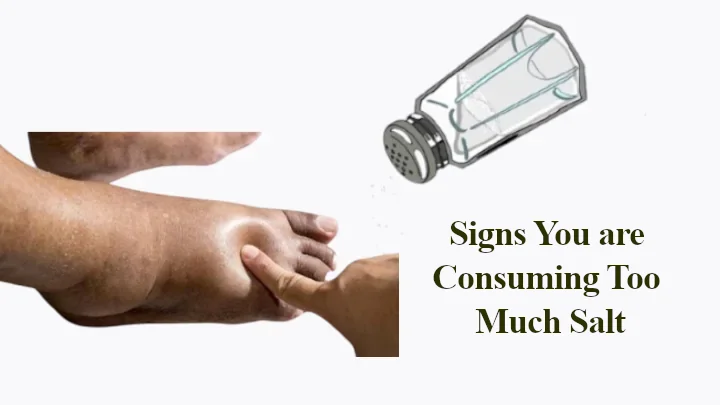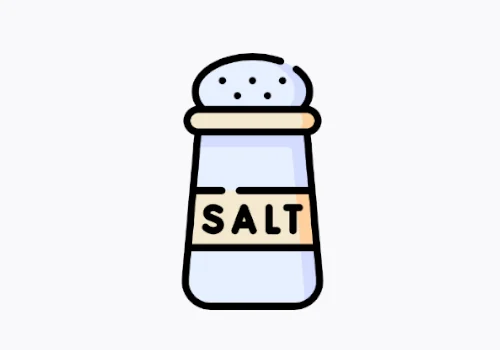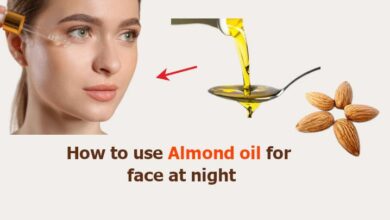Top 11 Signs You are Consuming Too Much Salt

Salt, an essential mineral for our bodies’ optimal functioning, is frequently found in our meals from a variety of sources. While a moderate amount is required for fluid balance, nerve cell function, and muscle contractions, an excessive amount can cause a variety of health problems.
It’s essential to be cautious of our salt consumption in modern society, where processed foods and dining out are common.
Are you subconsciously consuming more salt than your body requires? The indications may not always be obvious, but they can have a significant impact on your general well-being.
In this article, we’ll look at Signs You’re Consuming Too Much Salt:
Signs You are Consuming Too Much Salt
In this article we have describe the signs you are consuming too much salt

1. Persistent Thirst
It’s essential to be mindful of how much salt we’re consuming. Did you know that one of the early signs of excessive salt intake is persistent thirst?
When you consume too much salt, your body tries to dilute it by retaining more water, which can lead to increased appetite as your body signals the need for more fluids in order to balance out the levels.
2. Swelling or Edema
It’s essential to keep an eye on your salt intake. Too much salt can cause fluid retention and lead to swelling or edema in various parts of the body, such as ankles, legs, and hands.
If you notice any unexplained swelling, it might be a sign that you should take a look at how much salt you are consuming each day.
3. High Blood Pressure:
Too much salt can lead to elevated blood pressure, which is a severe health concern. Salt attracts water, and when there is excess in our bloodstream, it increases the volume of our blood and raises our blood pressure levels.
Monitoring your blood pressure regularly through doctor visits or at-home tests will help keep us informed about how healthy we are overall.
4. Frequent Headaches
Did you know that excessive salt intake can be linked to headaches and migraines in some individuals? The exact mechanism is still not fully understood, but scientists believe that high levels of salt can affect blood flow and contribute to these types of headaches. So next time you reach for the saltshaker, remember this!
5. Kidney issues
Your kidneys play a vital role in regulating the amount of salt in your body, and if you consume too much, it can put pressure on them and cause problems over time.
If you find yourself experiencing any changes in urination patterns or discomfort around the kidney area, then that could be a sign that it’s time for you to cut back on the amount of salt that you’re consuming.
6. Persistent Fatigue
While fatigue can be caused by a number of factors, excessive salt intake is one of them.
Overeating salt causes your body to retain extra fluid in order to dilute it, which puts added strain on your cardiovascular system and can make you feel tired and sluggish. So try to do the salty snacks sparingly!
7. Digestive Issues
It’s essential to be aware of how much salt you’re taking in each day. Too much can have a negative impact on your digestive system and contribute to stomach bloating and discomfort.
It can also exacerbate conditions like irritable bowel syndrome (IBS). That’s why it is so important to monitor your digestive health and take note of any changes that may occur as a result of salt intake.
8. Difficulty Losing Weight
If you’re feeling discouraged about not being able to lose weight despite your best efforts, it might be worth taking a closer look at your salt intake.
Too much of this mineral can lead to water retention, which makes it harder for us to drop those extra pounds.
9. Increased Blood Sugar Levels
Recent studies suggest that high salt intake could be linked to elevated blood sugar levels. This is especially concerning for those of us with diabetes or at risk of developing it in the future.
That’s why it’s so important to stay on top of our health and monitor our blood sugar levels regularly – not just for diabetes but also for overall well-being too!
10. Cardiovascular issues
We all know that high blood pressure can be dangerous, but did you know that excessive salt intake is also linked to various cardiovascular issues?
This includes an increased risk of heart disease and stroke. Reducing your daily salt consumption can help keep your heart healthy and reduce the chances of these severe conditions occurring down the line.
11. Excessive Thirst During the Night
If you find yourself waking up in the middle of the night feeling thirsty and needing a drink, it could mean you’re overeating salt.
The body is trying to balance itself by increasing fluid intake, even during sleep. So, if this happens regularly, it may be worth considering reducing your salt intake or speaking to a doctor about other options.
Conclusion
Maintaining excellent health requires being careful of your salt intake. Excessive salt consumption may show up in subtle ways, so it’s essential to pay attention to your body’s signs. If you recognize any of the above symptoms, consider making moderate changes to your diet.





